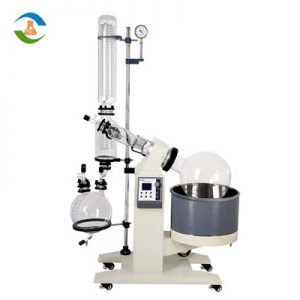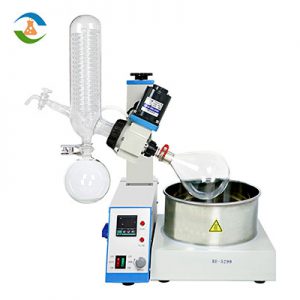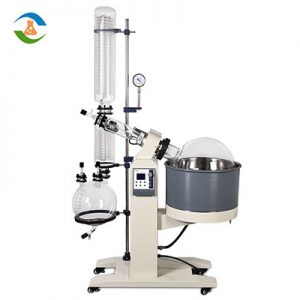Introduction Of Small Mini Rotary Evaporator
N-1100D rotary evaporator is a mini rotary evaporator, the capacity of the evaporating bottle is 0.5~1L, the capacity of the receiving bottle is 1L, and the speed is 10~180R/min. Small rotary evaporator is one of the commonly used equipment for purification and distillation experiments. It is heated at a constant temperature and rotated under negative pressure to form a thin film, evaporate efficiently, and condense and recover the solvent at the same time to achieve the effect of purification and separation.It is usually used in combination with circulating water vacuum pumps, diaphragm pumps, and low-temperature coolant circulating pumps.

Grouped Equipment
DLSB-5/10 low temperature coolant circulation pump
Capacity: 5L; Minimum no-load temperature: -10°C; Power 100W
SHZ-D(Ⅲ) Desktop Vacuum Pump
Capacity: 15L; Maximum vacuum: 70kpa

Features Of Small Mini Rotary Evaporator
1. The Mini rotary evaporator is simple, lightweight, and occupies a small area
2. Equipped with anti-backflow joint to prevent backflow.
3. The Small rotary evaporator has a vertical triple serpentine condensing tube, which increases the number of coils of the condensing tube, and the condensation area is twice that of the ordinary condensing tube
4. On the upper part of the mini rotary evaporator body, there is an auxiliary extension for adjusting the position of the buffer bottle or small sample bottle, the lifting stroke is 100mm, and the manual auxiliary delay stroke is 50mm to extend and slide.
5. When used in combination with the NVC type connection of the vacuum controller, the recovery efficiency of the small rotary evaporator can be greatly improved.
6. Optional Teflon gasket with excellent chemical resistance for recovery of low-boiling organic solvents, etc.
Applications Of Small Mini Rotary Evaporator
Mini rotary evaporator is often used in teaching experiments in laboratories, and is also an instrument and equipment for evaporation, concentration, crystallization, drying, separation, and solvent recovery in the scientific research and production processes of pharmaceutical, chemical, and biological products.
Installation Process
Host part
The host and supporting parts have been assembled at the factory, you can adjust the motor angle through the handle on the right side of the motor, and fine-tune the motor angle; you can adjust the height you want by rotating the handle below the motor
Glass part
(1) Insert the O-ring into the depression on the glass through shaft, put the glass through shaft into a suitable position in the motor, use the flange to pass through the glass through shaft and connect with the flange on the machine head, and fix the glass through shaft on the on the motor; after the connection is tightened, secure the spinner bottle at the flange.
(2) Buckle the flange on the flange port of the condenser, and fasten the retaining ring, respectively pad the PTFE gasket on the flange port on the right side of the condenser and the left side of the machine head, and connect the flange to the left side of the machine head. Flange connection to fix the condenser and make it vertically downwards, with each connection pointing backwards
(3) Install the condenser fixing bracket at a suitable height and position with screws, and wrap the condenser fixing ring around the condenser to stabilize the condenser.
(4) Connect the PTFE tube with the feeding valve and install it at the left end of the condenser.
(5) Connect the collection bottle with the conical grinding port at the lower end of the condenser, and clamp it with a bottle clamp.
(6) Put the water bath under the rotating bottle, add 2/3 of water or heat conduction oil into the pot, as shown in the figure
Power cord connection part
Connect the power cord to the power port on the back of the motor
Connection method of supporting equipment:
Use a vacuum tube to connect the vacuum pump or laboratory vacuum switch at the suction port of the condenser; use a silicone tube to connect the liquid inlet and outlet of the condenser and the liquid inlet and outlet of the supporting low-temperature cooling circulation pump.

Parameter
| Mol | Rotating Motor(W) | Water(Oil) Bath Power(W) | Temperature Control Range | Evaporation Rate(H2O) | Voltage | Lifing Height(mm) |
| RE-2000B | 40 | 1500 | RT~99℃ | ≥1L/h | 220V/50HZ | 0~140 |
| RE-5299 | 30 | 1500 | RT~99℃ | ≥1L/h | 220V/50HZ | 0~150 |
| RE-201D | 40 | 1200 | RT~399℃ | ≥1L/h | 220V/50HZ | 0~150 |
| RE-301 | 40 | 1500 | RT~399℃ | ≥1.5L/h | 220V/50HZ | 0~120 |
| RE-501 | 40 | 1500 | RT~399℃ | ≥1.5L/h | 220V/50HZ | 0~120 |
| RE-1002 | 180 | 3000 | RT~99(250)℃ | >3L/h | 220V/50HZ | 0~220 |
| RE-2002 | 180 | 5000 | RT~99(250)℃ | >5L/h | 220V/50HZ | 0~220 |
| RE-5002 | 250 | 7000/9000 | RT~99(250)℃ | >9L/h | 380V/50HZ | 0~220 |
| RE-2000B | 40 | 1500 | RT-99 Temperature control accuracy ±1℃ | ≥1 | 220V 50/60HZ | 0-140 |
| EXRE-1002 | 180 | 3000 | 0-99(250) | >3 | 220V 50/60HZ | / |
| EXRE-2002 | 180 | 5000 | 0-99(250) | >5 | 220V 50/60HZ | / |
| EXRE-5002 | 370 | 7000/9000 | 0-99(250) | >9 | 380V/50HZ | / |
| Model | Rotating Motor(W) | Water(Oil) Bath Power(W) | Temperature Control Range |
| RE-2000B | 40 | 1500 | RT~99℃ |
| RE-5299 | 30 | 1500 | RT~99℃ |
| RE-201D | 40 | 1200 | RT~399℃ |
| RE-301 | 40 | 1500 | RT~399℃ |
| RE-501 | 40 | 1500 | RT~399℃ |
| RE-1002 | 180 | 3000 | RT~99(250)℃ |
| RE-2002 | 180 | 5000 | RT~99(250)℃ |
| RE-5002 | 250 | 7000/9000 | RT~99(250)℃ |
| RE-2000B | 40 | 1500 | RT-99 Temperature control accuracy ±1℃ |
| EXRE-1002 | 180 | 3000 | 0-99(250) |
| EXRE-2002 | 180 | 5000 | 0-99(250) |
| EXRE-5002 | 370 | 7000/9000 | 0-99(250) |
FAQ
Q: What should I do if the small rotary evaporator motor heats up?
A: It is normal for the temperature difference of the motor to be ≤40°C. If △T>40℃, the stirring blade should be reduced, the load should be reduced, and the speed should be increased appropriately, using medium speed, avoiding the rotating resonance point, and maintaining the sealing and lubricating parts.
Q: How to clean the foam in the serpentine condenser tube of the Small rotary evaporator?
A:Method 1: Plastic foam is dissolved in methylene chloride and melts when touched. If the suction port of the rotary evaporator condenser is at the bottom, turn it upside down, take the DCM washing bottle and flush it against the place with foam, shake it, and pour it out. You need to handle it with care and don’t break it. .
Method 2: Rinse with a medium with a low boiling point, such as monochlorine or dichloromethane, and keep rotating. It can also be disassembled for cleaning, but be careful, the glass at the junction below is brittle and easy to break. Not a big problem.
Q: Why does the heating continue when the green indicator light of “OUT” or “ON” in the temperature controller is off?
A: If the indicator light is off and the temperature controller continues to heat, it is likely that the solid state relay or relay board is broken. It is recommended to replace the solid state relay or relay board in time.





